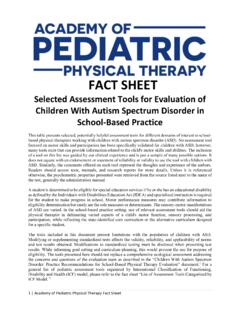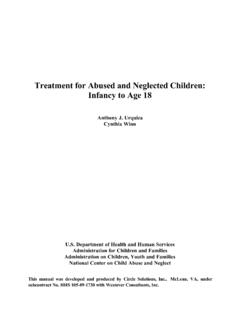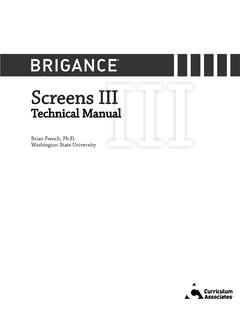Transcription of Evaluation of Students with Intellectual Disabilities
1 Evaluation OF Students WITH Intellectual Disabilities A student with an Intellectual disability is one who has been determined to have significantly sub-average Intellectual functioning as measured by a standardized, individually administered test of cognitive ability in which the overall test score is at least two standard deviations below the mean, when taking into consideration the standard error of measurement of the test; and concurrently exhibits deficits in at least two of the following areas of adaptive behavior : communication, self-care, home living, social interpersonal skills, and use of community resources, self-direction, functioning academic skills, work, leisure, health and safety and manifested during the developmental period.
2 19 Texas Administrative Code (c)(5), 34 Code of Federal Regulations (c)(6). Initial Referrals When diagnosing Intellectual Disability for the first time, it is of utmost importance to communicate this information to parents before the ARD committee meets. A conference with the parents prior to the ARD meeting will give them the opportunity to hear this information in a less stressful setting then a formal ARD meeting. For a child suspected of having an Intellectual disability, assessment personnel must administer a full scale intelligence test. The child s full scale IQ must be two or more standard deviations below the mean, when taking into consideration the standard error of measurement of the test instrument that was used.
3 A comprehensive intelligence test should be administered as well as adaptive behavior scales to determine an educational disability condition before the age of 18. Professional judgement is always important in the Evaluation progress, but especially critical when assessing for an Intellectual disability. For this reason, a review of records, interview with parents and teachers and student observation is vital to the assessment process. The group of qualified professionals must be able to document their findings through a variety of sources and make recommendation for instruction in the full individual and initial Evaluation if making the determination of a disability condition of Intellectual disability.
4 If current measures of cognitive and adaptive functioning fall more than two standard deviations below the mean for the child s age, and the group of qualified professional has given consideration of applicable background variables and notable milestones then making a determination of a disability condition is appropriate. National Dissemination Center for Children with Disabilities explains that the causes of Intellectual Disabilities vary from pregnancy issues and complications at birth to genetic conditions and health problems early in life, including diseases like measles and contact with poisonous substances such as lead and mercury.
5 Some of the conditions and events strongly associated with Intellectual disability include: presence of a genetic disorder known to be associated Intellectual challenges ( , Down syndrome, Fragile X syndrome, Williams syndrome, Prader-Willi syndrome, Angelman syndrome); prenatal exposure to alcohol or illegal substances; physical illness experienced by the mother during pregnancy; lack of oxygen to the brain during labor or delivery; extremely premature delivery; childhood illness ( , meningitis) and some types of infections; onset of seizure activity at or shortly following delivery; inexplicable regression of attained milestones during the first 18 months of life; There are many signs of an Intellectual disability.
6 For example, children with an Intellectual disability may: sit up, crawl, or walk later than other children; learn to talk later, or have trouble speaking, find it hard to remember things, not understand how to pay for things, have trouble understanding social rules, have trouble seeing the consequences of their actions, have trouble solving problems, and/or have trouble thinking logically. #char Any of these conditions and/or early signs of Intellectual disability should be documented in the full individual and initial Evaluation . Initial Evaluation for children age 5 year The use of Kaufman ABC-II NU, WPPSI-IV, , or SB Early Childhood are most commonly used to evaluate a young child with Intellectual disability.
7 I f the child s cognitive functioning or behavior is too limited to allow for such a measure, documentation of attempts to administer formal assessments must be made and reported in the Full Initial and Individual Evaluation . Then, a developmental profile such, DAYC2 , DP3, Battelle, or Ages and Stages Questionaire-3 (ASQ3) could be used to describe the child s functioning. The assessment personnel must also evaluate the areas of adaptive behavior : communication, self-care, home living, social interpersonal skills, and use of community resources, self-direction, functioning academic skills, work, leisure, health and safety.
8 In this age range the parent/guardian would be the primary source. Other sources, such as teachers, therapist, or daycare providers could give input. Remember, non-school employees will require release of confidential information. The child must exhibits deficits in two or more of the adaptive behavior areas listed above. The vineland adaptive behavior scale -III and/or the adaptive behavior Assessment System-III are two options to use to gather the adaptive behavior information. If a child is three to five years of age and has experienced one of the events or conditions strongly associated with cognitive deficits listed previously, and has a standardized, individually administered test of cognitive ability in which the overall test score is at least two standard deviations below the mean, when taking into consideration the standard error of measurement of the test; and concurrently exhibits deficits in at least two of the following areas of adaptive behavior , the child meets the criteria for an Intellectual disability condition.
9 For children under the age of five years, who are unable to undergo systematic assessments of Intellectual functioning, including children who are too young to participate in standardized testing and have not experienced one of the events or conditions strongly associated with cognitive deficits listed above a condition of non-categorical early childhood-ID (NCEC-ID) should be considered instead of Intellectual disability. NCEC-ID category requires reassessment by age six. In recognition that cognitive scores can be flexible and unreliable at such an early age, a child who is evaluated before age five should be reassessed with a full comprehensive assessment at age five, or earlier by a group of qualified professionals if the child demonstrates acquisition or loss of skills that affect general Intellectual ability.
10 Evaluation for School Age Children Caution should be used when identifying an older school age child with an Intellectual disability unless the child has experienced one of the conditions listed on the previous page or the condition of Intellectual disability is being added. (ie: AU/SI/ID, OHI/ID, ED/ID) Part Scores Overall IQ score is the most reliable and the best predictor of educational outcomes. Part scores (index, clusters and factors) come from subsets of the same subtest that contribute to overall IQ. Part scores have lower reliability and variation is influence by regression to the mean.




